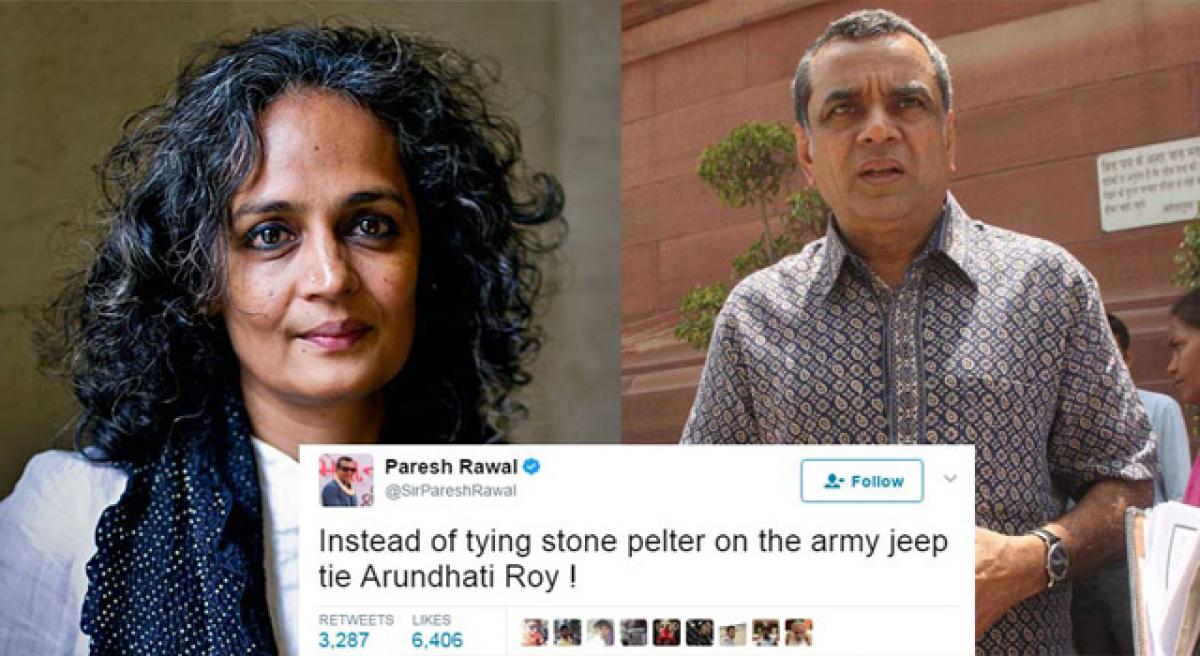Just In

It seems to be yesterday once more with the deafening silence of the Sahitya Akademi and other cultural institutions over the provocative threat that acclaimed actor and BJP lawmaker Paresh Rawal has made against writer Arundhati Roy.
It seems to be yesterday once more with the deafening silence of the Sahitya Akademi and other cultural institutions over the provocative threat that acclaimed actor and BJP lawmaker Paresh Rawal has made against writer Arundhati Roy.
Why hasn't the Sahitya Akademi, which gloriously calls itself "India's National Academy of Letters," spoken a word against it? Why hasn't the Indian Council for Cultural Relations (ICCR), which aims to promote cultural exchanges with other countries, uttered a word for the writer who brought us international fame by becoming the first Indian to win the Booker Prize? And by the way, where is the Culture Minister? Rawal kicked up a storm by his tweet targeting Booker Prize-winning novelist and activist Arundhati Roy.
The vicious comment that urged violence against the much-acclaimed author of "The God of Small Things" was in sharp contrast to the otherwise comic personality he was thought to adorn. "Instead of tying stone pelter on the army jeep tie up Arundhati Roy!" tweeted Rawal, a Lok Sabha parliamentarian from Gujarat.
He was referring to the incident last month of the army in Kashmir tying a protester to its vehicle as a human shield against stone-pelters. Earlier, on May 17 too, he had tweeted "70 lakh Indian army can't defeat azadi gang of Kashmir - Arundhati Roy. Her birth certi (certificate) in fact is a regret letter from maternity ward".
While this particular act of the army has been met with mixed reactions, Rawal's tweet is of a completely different nature and should not be confused with the "nationalistic" paradigm that many wish for. It is symbolic of the contempt and malice that he shields under his Bollywood image and, most certainly, he would have found another context to express his animosity for the author had there been no "human shield" incident in the first place.
On the other hand, Roy has been a much controversial figure too. She has maintained that India is an "occupying force" in Kashmir and has protested against the use of force and military in the Valley at various foras. "Kashmir is in the process of being isolated, cut off from the outside world by two concentric rings of border patrols - in Delhi as well as Srinagar - as though it's already a free country with its own visa regime. Within its borders of course, it's open season for the government and the army.
The art of controlling Kashmiri journalists and ordinary people with a deadly combination of bribes, threats, blackmail and a whole spectrum of unutterable cruelty has evolved into a twisted art form," she wrote in "The Dead Begin to Speak Up in India" in 2011. Criticism and dissent is the lifeblood of any democracy and Rawal, like the rest of us, is free to voice his criticism of Roy on public platforms. But his tweet, which has been liked by 21,000 users and retweeted more than 12,000 times, perhaps crosses the line of criticism and takes it a step closer to direct provocation and threat. It is all the more absurd as it comes from a Parliamentarian.
Even if one were to ignore the provocation and threat in Rawal's tweet, the deafening silence of his party's high command and, more so, of the Sahitya Akademi and other cultural bodies is perplexing. There is no hope of finding any reasonable answer to their silence any time soon, but such vitriol against writers and artists is intertwined with the philosophies of the RSS, the ideological backbone of the ruling dispensation. And with RSS sympathisers at the helm of most of India's cultural institutions, there is little hope that those writers and artists who differ with their ideology will be protected.
For instance, Baldev Sharma was appointed as Chairman of the National Book Trust in March 2015, after the HRD Ministry cut short veteran Malayalam writer A. Sethumadhavan's term. Sharma, who is since called "Baldev Bhai Sharma", has spent five years as editor of RSS mouthpiece Panchjanya and his silence is no wonder to those who have followed his RSS-centred career.
Sahitya Akademi President Vishwanath Prasad Tiwari, too, shares a similar background and even when scores of leading writers returned their Sahitya Akademi Awards in 2015 (against the alleged rising intolerance and attempts to throttle dissent in the country), Tiwari was at a loss for words to speak for the Akademi winning writer M.M. Kalburgi, who was murdered for hurting religious sentiments.
The current ICCR President, Lokesh Chandra, although an Indira Gandhi loyalist, has shown significant attachment to the RSS in recent years. The list goes on and on. Almost all cultural institutions are now being spearheaded by those with RSS patronage and are thus becoming dumb spectators to such vitriol against writers, artists and intellectuals.
By Saket Suman

© 2024 Hyderabad Media House Limited/The Hans India. All rights reserved. Powered by hocalwire.com







